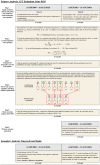Risk of Alzheimer's Disease Following Influenza Vaccination: A Claims-Based Cohort Study Using Propensity Score Matching
- PMID: 35723106
- PMCID: PMC9484126
- DOI: 10.3233/JAD-220361
Risk of Alzheimer's Disease Following Influenza Vaccination: A Claims-Based Cohort Study Using Propensity Score Matching
Abstract
Background: Prior studies have found a reduced risk of dementia of any etiology following influenza vaccination in selected populations, including veterans and patients with serious chronic health conditions. However, the effect of influenza vaccination on Alzheimer's disease (AD) risk in a general cohort of older US adults has not been characterized.
Objective: To compare the risk of incident AD between patients with and without prior influenza vaccination in a large US claims database.
Methods: Deidentified claims data spanning September 1, 2009 through August 31, 2019 were used. Eligible patients were free of dementia during the 6-year look-back period and≥65 years old by the start of follow-up. Propensity-score matching (PSM) was used to create flu-vaccinated and flu-unvaccinated cohorts with similar baseline demographics, medication usage, and comorbidities. Relative risk (RR) and absolute risk reduction (ARR) were estimated to assess the effect of influenza vaccination on AD risk during the 4-year follow-up.
Results: From the unmatched sample of eligible patients (n = 2,356,479), PSM produced a sample of 935,887 flu-vaccinated-unvaccinated matched pairs. The matched sample was 73.7 (SD, 8.7) years of age and 56.9% female, with median follow-up of 46 (IQR, 29-48) months; 5.1% (n = 47,889) of the flu-vaccinated patients and 8.5% (n = 79,630) of the flu-unvaccinated patients developed AD during follow-up. The RR was 0.60 (95% CI, 0.59-0.61) and ARR was 0.034 (95% CI, 0.033-0.035), corresponding to a number needed to treat of 29.4.
Conclusion: This study demonstrates that influenza vaccination is associated with reduced AD risk in a nationwide sample of US adults aged 65 and older.
Keywords: Alzheimer’s disease; cohort studies; incidence; influenza vaccines; pharmacoepidemiology; retrospective studies; vaccination.
Conflict of interest statement
Authors’ disclosures available online (
Figures



References
-
- (2021) 2021 Alzheimer’s disease facts and figures. Alzheimers Dement 17, 327–406. - PubMed
-
- Livingston G, Huntley J, Sommerlad A, Ames D, Ballard C, Banerjee S, Brayne C, Burns A, Cohen-Mansfield J, Cooper C, Costafreda SG, Dias A, Fox N, Gitlin LN, Howard R, Kales HC, Kivimaki M, Larson EB, Ogunniyi A, Orgeta V, Ritchie K, Rockwood K, Sampson EL, Samus Q, Schneider LS, Selbaek G, Teri L, Mukadam N (2020) Dementia prevention, intervention, and care: 2020 report of the Lancet Commission. Lancet 396, 413–446. - PMC - PubMed
-
- Webers A, Heneka MT, Gleeson PA (2020) The role of innate immune responses and neuroinflammation in amyloid accumulation and progression of Alzheimer’s disease. Immunol Cell Biol 98, 28–41. - PubMed
-
- Bornand D, Toovey S, Jick SS, Meier CR (2016) The risk of new onset depression in association with influenza –a population-based observational study. Brain Behav Immun 53, 131–137. - PubMed
Publication types
MeSH terms
Grants and funding
LinkOut - more resources
Full Text Sources
Medical
Miscellaneous

